See also
- Wind wave, which includes waves in the ocean
Ocean Wave was an American racehorse.
Ocean Wave or Ocean Waves may also refer to:
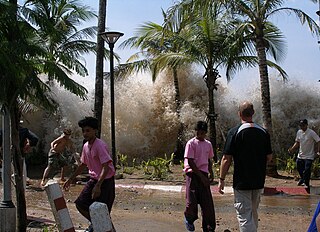
A tsunami is a series of waves in a water body caused by the displacement of a large volume of water, generally in an ocean or a large lake. Earthquakes, volcanic eruptions and other underwater explosions above or below water all have the potential to generate a tsunami. Unlike normal ocean waves, which are generated by wind, or tides, which are in turn generated by the gravitational pull of the Moon and the Sun, a tsunami is generated by the displacement of water from a large event.
Boys Don't Cry may refer to:
Tidal wave may refer to:

A rip current is a specific type of water current that can occur near beaches where waves break. A rip is a strong, localized, and narrow current of water that moves directly away from the shore by cutting through the lines of breaking waves, like a river flowing out to sea. The force of the current in a rip is strongest and fastest next to the surface of the water.
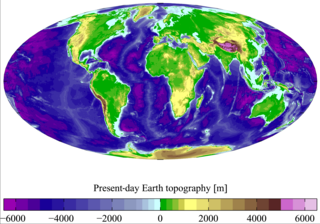
Physical oceanography is the study of physical conditions and physical processes within the ocean, especially the motions and physical properties of ocean waters.

Rogue waves are unusually large and unpredictable surface waves that can be extremely dangerous to ships and isolated structures such as lighthouses. They are distinct from tsunamis, which are often almost unnoticeable in deep waters and are caused by the displacement of water due to other phenomena. A rogue wave at the shore is sometimes called a sneaker wave.
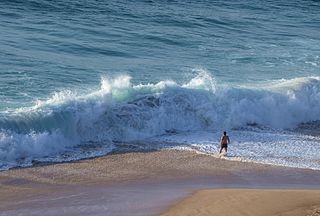
In fluid dynamics, a wind wave, or wind-generated water wave, is a surface wave that occurs on the free surface of bodies of water as a result of the wind blowing over the water's surface. The contact distance in the direction of the wind is known as the fetch. Waves in the oceans can travel thousands of kilometers before reaching land. Wind waves on Earth range in size from small ripples to waves over 30 m (100 ft) high, being limited by wind speed, duration, fetch, and water depth.

Wave power is the capture of energy of wind waves to do useful work – for example, electricity generation, water desalination, or pumping water. A machine that exploits wave power is a wave energy converter (WEC).

A wave pool is a swimming pool in which there are artificially generated, large waves, similar to those of the ocean. Wave pools are often a major feature of water parks, both indoors and outdoors, as well as some leisure centres.

A tropical wave, in and around the Atlantic Ocean, is a type of atmospheric trough, an elongated area of relatively low air pressure, oriented north to south, which moves from east to west across the tropics, causing areas of cloudiness and thunderstorms. Tropical waves form in the easterly flow along the equatorial side of the subtropical ridge or belt of high air pressure which lies north and south of the Intertropical Convergence Zone (ITCZ). Tropical waves are generally carried westward by the prevailing easterly winds along the tropics and subtropics near the equator. They can lead to the formation of tropical cyclones in the north Atlantic and northeastern Pacific basins. A tropical wave study is aided by Hovmöller diagrams, a graph of meteorological data.

On 26 December 2004, at 07:58:53 local time (UTC+7), a major earthquake with a magnitude of 9.2–9.3 Mw struck with an epicentre off the west coast of northern Sumatra, Indonesia. The undersea megathrust earthquake, known by the scientific community as the Sumatra–Andaman earthquake, was caused by a rupture along the fault between the Burma Plate and the Indian Plate, and reached a Mercalli intensity up to IX in some areas.
Aquamarine may refer to:
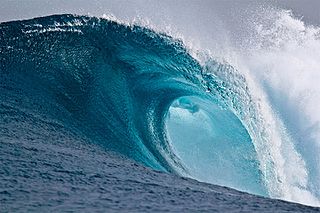
In fluid dynamics and nautical terminology, a breaking wave or breaker is a wave with enough energy to "break" at its peak, reaching a critical level at which linear energy transforms into wave turbulence energy with a distinct forward curve. At this point, simple physical models that describe wave dynamics often become invalid, particularly those that assume linear behaviour.

Lake surfing is surfing on any lake with sufficient surface area for wind to produce waves. As with ocean surfing, ideal wave conditions are when the wind switches offshore. However, when this occurs over a lake the waves generated by previous onshore wind subside relatively quickly. This means lake surfers have a shorter window of opportunity to surf ideal waves. Lake surfers are often out during and experiencing the same storm that creates the waves whereas ocean surfers are more often surfing on swell produced by storms hundreds of miles away and that may have taken days to reach shore. In addition to making it more difficult to manage surfboards, high winds can make the face of a wave and water surface rough. Increased wave frequency due to shorter fetch results in less rest between waves and sets of waves. This can make it necessary to paddle out through waves because there may not be a long enough pause between sets to paddle out between them.
A rogue wave is an abnormally large ocean wave.
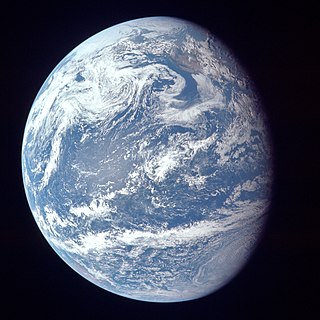
The ocean is the body of salt water that covers approx. 70.8% of Earth. In English, the term ocean also refers to any of the large bodies of water into which the world ocean is conventionally divided. The following names describe five different areas of the ocean: Pacific, Atlantic, Indian, Antarctic/Southern, and Arctic. The ocean contains 97% of Earth's water and is the primary component of Earth's hydrosphere; thus the ocean is essential to life on Earth. The ocean influences climate and weather patterns, the carbon cycle, and the water cycle by acting as a huge heat reservoir.

A surf break is a permanent obstruction such as a coral reef, rock, shoal, or headland that causes a wave to break, forming a barreling wave or other wave that can be surfed, before it eventually collapses. The topography of the seabed determines the shape of the wave and type of break. Since shoals can change size and location, affecting the break, it takes commitment and skill to find good breaks. Some surf breaks are quite dangerous, since the surfer can collide with a reef or rocks below the water.
Liquid Robotics is an American marine robotics corporation that designs, manufactures and sells the Wave Glider, a wave and solar powered unmanned surface vehicle (USV). The Wave Glider harvests energy from ocean waves for propulsion. With this energy source, Wave Gliders can spend many months at a time at sea, collecting and transmitting ocean data.

Ocean Wave was a steamboat that was operated from 1891 to 1897 on the Columbia River, from 1897 to 1899 on Puget Sound and from 1899 to 1911 as a ferry on San Francisco Bay. Ocean Wave is perhaps best known for transporting summer vacationers from Portland, Oregon to seaside resorts near Ilwaco, Washington during its service on the Columbia River. This vessel is also known for being the first ferry placed in service by the Atchison, Topeka and Santa Fe Railway.

Storm petrel may refer to one of two bird families, both in the order Procellariiformes, once treated as the same family.